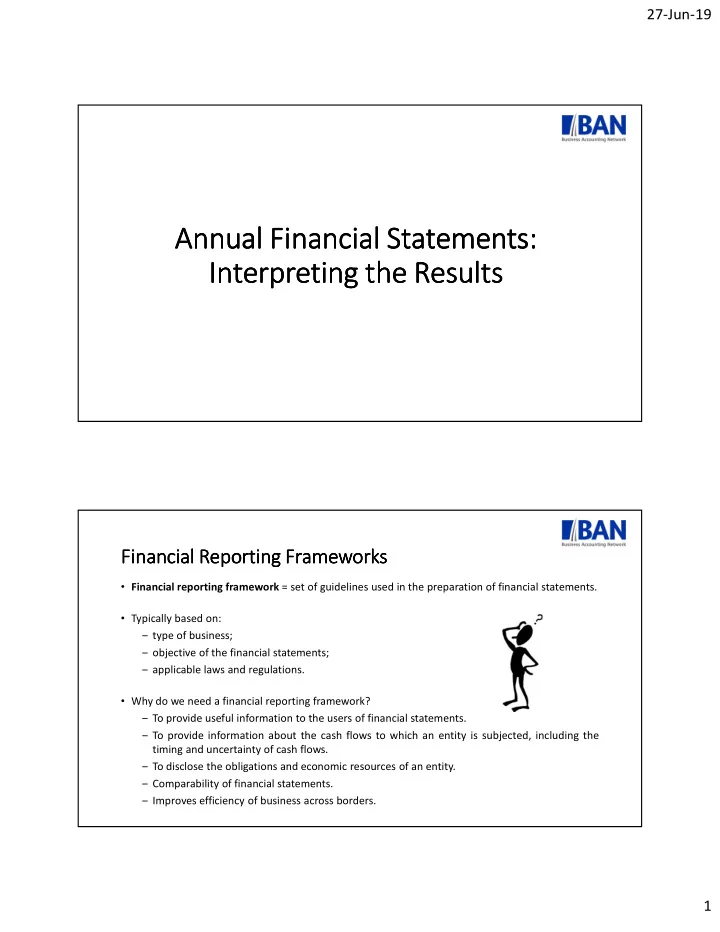

27-Jun-19 Annual Financial Statements: Annual Financial Statements: Annual Financial Statements: Annual Financial Statements: Interpreting the Interpreting the Interpreting the Interpreting the Results Results Results Results Financial Reporting Frameworks Financial Reporting Frameworks Financial Reporting Frameworks Financial Reporting Frameworks • Financial reporting framework = set of guidelines used in the preparation of financial statements. • Typically based on: ‒ type of business; ‒ objective of the financial statements; ‒ applicable laws and regulations. • Why do we need a financial reporting framework? ‒ To provide useful information to the users of financial statements. ‒ To provide information about the cash flows to which an entity is subjected, including the timing and uncertainty of cash flows. ‒ To disclose the obligations and economic resources of an entity. ‒ Comparability of financial statements. ‒ Improves efficiency of business across borders. 1
27-Jun-19 IFRS for SMEs versus Tax Base IFRS for SMEs versus Tax Base IFRS for SMEs versus Tax Base IFRS for SMEs versus Tax Base Tax base • Based on historical cost • Profit or loss equates to taxable profit or loss – except for permanent differences IFRS for SMEs (International Financial Reporting Standards for Small and Medium-sized Entities) • Based on principles of fair value • Profit or loss does not equate to taxable profit or loss • Requires management accountability and responsibility for accounting policy choices, estimates and judgements made. IFRS for SMEs versus Tax Base IFRS for SMEs versus Tax Base IFRS for SMEs versus Tax Base IFRS for SMEs versus Tax Base Examples Line Item IFRS for SMEs Tax Base Property, plant and equipment Depreciation Wear and tear Investment property Fair value gain/loss - Mortgage bond Amortised cost Historical cost Office rental payments Straight-lining Expense Salary bonuses Provision Expense Taxation Current and deferred tax Current tax 2
27-Jun-19 Interpreting the Results Interpreting the Results Interpreting the Results Interpreting the Results Sole proprietor – Tax base • Income Statement • Statement of Personal Assets and Liabilities Interpreting the Results Interpreting the Results Interpreting the Results Interpreting the Results Company – IFRS for SMEs • Financial statement reports • Director’s Report • Statement of Financial Position • Statement of Comprehensive Income • Statement of Changes in Equity • Statement of Cash Flows • Accounting Policies and Notes 3
27-Jun-19 Interpreting the Results Interpreting the Results Interpreting the Results Interpreting the Results Financial statement reports Compilation • Does not involve audit or review thus no assurance about the financial statements is provided. • Provides “implied assurance” about the fair presentation and relevance of the financial statements (as required by accounting standards) and the procedures prescribed in terms of ISRS 4410. • Requires independence and integrity of the compiler and compliance to accounting standards. • Involves the preparation of working papers and documentary evidence to support compilation procedures . • Introduces the concept of “materiality”. Interpreting the Results Interpreting the Results Interpreting the Results Interpreting the Results Financial statement reports Independent Review • Provides limited (negative) assurance - expresses an opinion that the financial statements, in all material aspects, comply with the accounting framework. • Requires independence and integrity of the independent reviewer and compliance to accounting standards. • Reviewer must assess financial statement risk - application of professional judgement or scepticism, analytical procedures and inquiry. • Involves obtaining and documenting evidence for items identified to have material risks. 4
27-Jun-19 Interpreting the Results Interpreting the Results Interpreting the Results Interpreting the Results Financial statement reports Audit • Provides reasonable (positive) assurance - expresses an opinion that the financial statements, in all material aspects, comply with the accounting framework. • Must be performed by a registered auditor and must comply with certain standards. • Involves performing procedures on the amounts disclosed in the financial statements - procedures are designed to identify material misstatements and regularly involve testing a sample of transactions and balances. • Includes detailed review of the financial statements, including disclosures, to ensure compliance with accounting standards and company law. Interpreting the Results Interpreting the Results Interpreting the Results Interpreting the Results Going concern • Fundamental principle of accounting. • Assumes the ability of the entity to continue operations in the foreseeable future = during and beyond the next financial year a company will complete its current plans, use its existing assets and continue to meet its financial obligations. • Application of the going concern presumption: ‒ prepayments ‒ accruals of expenses ‒ depreciation of assets based on estimated useful life • Example: XYZ (Pty) Ltd is unable to make payments to its creditors due to a very weak liquidity position. The court grants a liquidation order upon the request of one of the company’s creditors. The company is no longer a going concern because sufficient evidence is available to believe that the company cannot continue its operations in future. 5
27-Jun-19 Interpreting the Results Interpreting the Results Interpreting the Results Interpreting the Results Extracts from AFS Interpreting the Results Interpreting the Results Interpreting the Results Interpreting the Results Extracts from AFS 6
27-Jun-19 Interpreting the Results Interpreting the Results Interpreting the Results Interpreting the Results Extracts from AFS Interpreting the Results Interpreting the Results Interpreting the Results Interpreting the Results Extracts from AFS 7
27-Jun-19 Interpreting the Results Interpreting the Results Interpreting the Results Interpreting the Results Extracts from AFS Interpreting the Results Interpreting the Results Interpreting the Results Interpreting the Results Extracts from AFS 8
27-Jun-19 Interpreting the Results Interpreting the Results Interpreting the Results Interpreting the Results Where to from here? • Management reports • Ratio analysis • Analysing trends • Understanding best practices and market conditions • … Decision-making! Join us for the next of our Client Webinar series: Unpacking the Differences: Audit/Independent Review/Compilation Webinar Made Simple for the SME Business Sector 25 July 2019 09:00 – 10:00 9
27-Jun-19 Questions? Questions? Questions? Questions? 10
Recommend
More recommend